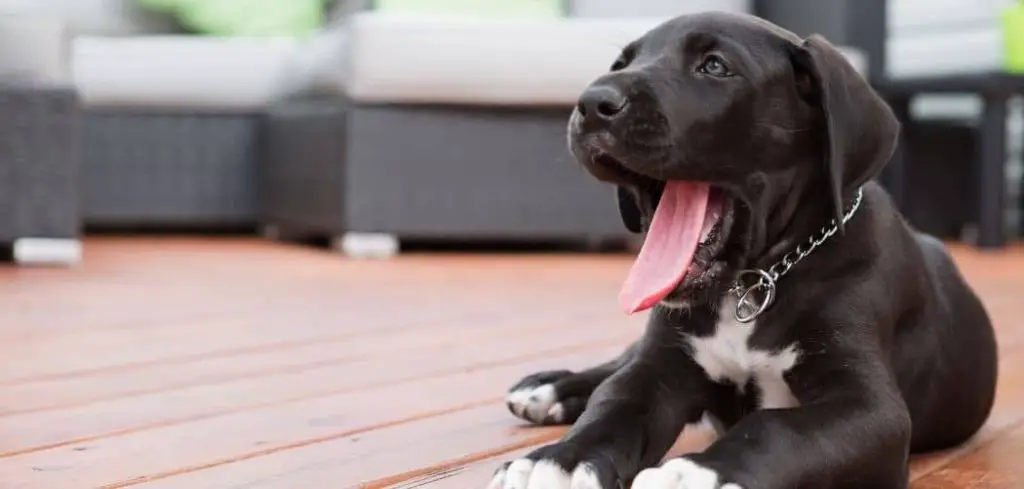It can be concerning to watch your dog repeatedly lick their lips, paws, the floor, or even the air after mealtime. While the behavior may seem harmless at first, it can sometimes indicate an underlying issue that needs attention.
We outline the common causes of excessive licking after eating in dogs, what you can do at home, and when to seek veterinary help.
Dog Licks Excessively After Eating — Why It Happens
Excessive licking after meals can be linked to gastrointestinal discomfort, dental issues, nausea, anxiety, or even compulsive behavior. Some dogs may lick due to acid reflux or bloating, while others might be experiencing oral pain or discomfort in the throat.
Behavioral causes such as stress or food-related anxiety can also trigger this repetitive action.
In certain cases, it becomes a learned or compulsive behavior that persists even when the initial cause is resolved.

Common Causes of Excessive Licking After Eating in Dogs
Acid Reflux
When stomach acid flows backward into the esophagus, it can cause irritation and discomfort, known as acid reflux or gastroesophageal reflux disease (GERD).
Dogs may try to soothe the burning sensation by licking their lips or surroundings shortly after eating.
You might notice signs like gulping, burping, lip-smacking, or pacing. Some dogs may also vomit or appear restless.
This condition can become chronic and uncomfortable if not addressed, especially if inflammation or esophageal damage occurs.
Read more: Dog Eating and Drinking Excessively (What this behavior may mean)
Nausea
Feeling nauseated is a common reason why dogs lick excessively after eating.
This can be triggered by eating too quickly, consuming something that doesn’t agree with their stomach, or underlying illnesses such as pancreatitis or kidney disease.
You may observe drooling, a lack of appetite, and restlessness along with the licking.
Nausea isn’t always an emergency, but when frequent, it’s a red flag that something more serious might be going on internally.
Dental or Oral Pain
Pain in the mouth—whether from a broken tooth, infected gums, or oral ulcers—can prompt excessive licking after meals.
Food may irritate these sensitive areas, leading your dog to lick in response to pain or discomfort.
Bad breath, pawing at the mouth, chewing on one side, or dropping food are common accompanying symptoms.
Oral health problems can progress quickly, so this is an important area to investigate early.
Foreign Object Stuck in the Mouth or Throat
If a piece of kibble, a bone shard, or another object gets lodged in the mouth or throat, your dog might lick persistently after eating in an attempt to dislodge it.
Other signs may include gagging, repeated swallowing, pawing at the face, or coughing.
This scenario can turn into an emergency if breathing becomes difficult or swallowing is completely blocked.
Prompt evaluation is important to prevent escalation.
Anxiety or Stress
Some dogs develop a conditioned stress response around food, especially if they experienced resource guarding, sudden changes in routine, or previous negative feeding experiences.
Licking after eating can be a self-soothing behavior that helps them calm down.
This licking tends to happen in patterns and may be accompanied by pacing, whining, or attention-seeking behavior.
Left unchecked, anxiety-related behaviors can worsen or become obsessive over time.
Compulsive Behavior
If the licking has been going on for a long time without a clear medical reason, it may have developed into a compulsive habit.
Dogs that are bored, under-stimulated, or have limited daily routines are more prone to these patterns.
The behavior can persist even when the original trigger is gone and may spread to other contexts.
Veterinary behaviorists often compare this to obsessive-compulsive disorder in humans.
What to Do If Your Dog Is Licking Excessively After Eating
If your dog licks obsessively after meals, start by monitoring when and how the behavior happens. Keep track of what they eat, how fast they eat, and how long the licking lasts.
Try switching to a slow-feeder bowl if your dog eats too quickly, which can reduce gulping and minimize acid reflux or nausea.
Offer small, frequent meals rather than one or two large portions. This helps regulate stomach acid and keeps digestion smoother.
Make sure your dog isn’t licking out of boredom. Provide enrichment activities such as puzzle toys or gentle exercise around feeding times.
If dental disease is suspected, inspect your dog’s mouth (if safe) and consider booking a dental checkup. Good oral hygiene can go a long way in improving overall comfort.
When to Call or Visit Your Vet
If your dog’s excessive licking is new, frequent, or accompanied by other concerning symptoms, it’s time to consult your veterinarian.
Watch for vomiting, diarrhea, changes in appetite, lethargy, or weight loss.
Also seek help if you notice signs of oral pain like bad breath, difficulty chewing, or pawing at the mouth.
If your dog becomes frantic during or after eating or if breathing issues or gagging develop, urgent care is needed.
Long-standing behavior that persists despite changes in routine may warrant evaluation by a vet behaviorist or trainer.
Read more: Dog Licking Paws Excessively (When to worry and what to do)
Key Takeaway
Excessive licking after eating isn’t always a cause for alarm, but it can be a sign of discomfort or stress.
By identifying the pattern and potential cause, you can make changes that improve your dog’s well-being.
Whether the issue is medical or behavioral, early attention can prevent complications and bring peace of mind.
If in doubt, don’t hesitate to call your vet and get a professional evaluation.
